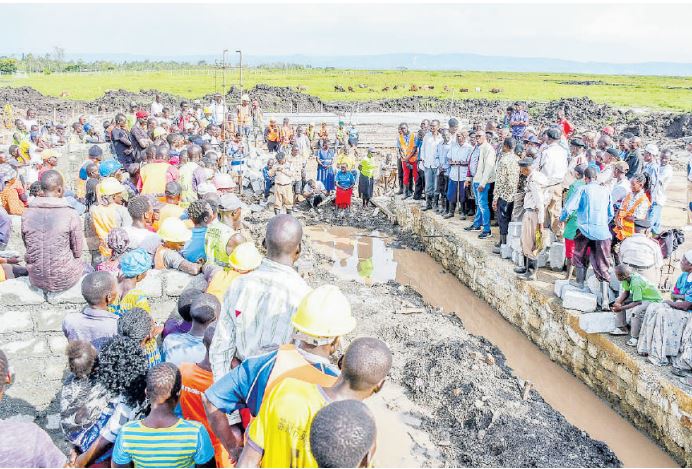
Efforts to revitalise Kenya’s blue economy are back on track with the resumption of construction of the Sh2.5 billion Kabonyo Kanyagwal Fisheries and Aquaculture Centre of Excellence in Kisumu county.
The project, whose works had stalled, threatening the project's timelines, is a partnership between the Kenyan and Hungarian governments.
Project engineer Vundi Mbwika said the construction, currently at 30 per cent completion, is progressing steadily.
“Five permanent buildings are under construction and we have begun excavating a canal to manage backflow from Lake Victoria and overflow from River Nyando,” Mbwika said.
To safeguard the facility from rising water levels, an 800-metre access road is being developed within the site, alongside a three-metre-wide flood canal.
The first phase of the project, he said, was expected to be complete by June 2026.
“Once operational, the facility will produce 28 million fingerlings annually from 20 fish ponds,” he said.
It will also feature administrative blocks, dormitories, staff quarters, a hatchery, cold storage and processing units.
The site roared back to life, with heavy machinery deployed and construction crews back on the ground, after a directive by President William Ruto to fast-track the stalled works during a meeting with county leaders at State House last month.
Kisumu Governor Anyang’ Nyong’o lauded the intervention and expressed satisfaction with the ongoing works.
“I want to thank President Ruto for his commitment. He assured us at State House that the project would be delivered and we are seeing that promise being fulfilled,” Nyong’o said.
He added that the centre will serve as both a production site and a specialised training ground for farmers and fisheries stakeholders, significantly boosting aquaculture in the region.
“Fish bred at the facility will be distributed to smallholder farmers and used to restock Lake Victoria, where fish stocks have declined sharply,” he said.
“Thousands of small-scale fish farmers stand to benefit from this initiative, which aligns with national efforts to enhance food security and increase household incomes in the lake region.”
The project is poised to create numerous short- and long-term job opportunities for engineers, artisans, architects and other professionals, injecting economic vitality into the county.
CEC for agriculture and fisheries, Kenneth Onyango, said the project will be a game-changer for Kabonyo Kanyagwal ward, an area long plagued by perennial flooding.
“This project will stimulate the local economy through enhanced fish production, infrastructure upgrades and job creation,” he said.
He added that it will also benefit non-fishing communities by mitigating floods and unlocking idle land for farming.
Onyango said the road linking Korowe to the site will be tarmacked to ease transportation of fish and agricultural produce.
The centre will also provide agribusiness training to young people as part of a broader strategy to combat youth unemployment.
“Through modern aquaculture, restocking efforts and youth engagement, the facility will reverse declining fish yields and uplift fishing communities,” he noted.
Locals welcomed the resumption of works, with community members expressing hope that the facility will be completed without further delays.
“Residents of Kabonyo Kanyagwal are very happy. The project has finally taken off after a long delay. We thank the President and urge him to ensure it is completed within one year,” said Bartholomew Ogutu, a resident.











